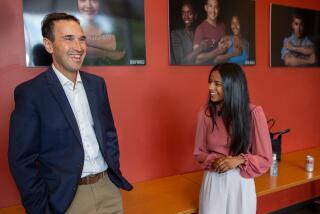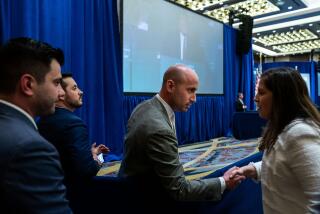Ex-Banker Transforming Business School : Education: The former chairman and CEO of First Boston Corp. is teaching the importance of change and adaptability in his new job as a graduate school dean at the University of Maryland.
- Share via
COLLEGE PARK, Md. — After riding a wave of change to the top of a leading Wall Street investment banking firm, William Mayer is aiming his philosophy of adaptability and foresight at a younger generation.
In his first year as dean of the University of Maryland’s graduate school of business, the former chairman and chief executive officer of First Boston Corp. already has commanded national attention.
The school won a $5-million donation from a wealthy alumnus. Two leading business magazines have listed it as one of the best academic buys in the country for a master’s in business administration.
The sandy-haired, well-spoken former deal maker said he wants to change how business is taught and train students in skills they can apply on the job.
“If there’s anything we’re going to do different, it’s how you teach, not what you teach,” said Mayer, 53.
He said his primary mission is to gain widespread recognition for the college where he received his business degree. He intends to do that by focusing on graduate studies, which receive the most attention, and listening to what employers are looking for in an MBA graduate.
Mayer’s own career shift came as business schools all over the country began to face growing questions about the career value of an MBA. The sluggish national economy and efforts by many companies to shrink their staffs have resulted in far fewer campus visits by corporate recruiters.
Graduates at many business schools, having spent or borrowed enormous sums for tuition on the assumption they could pick and choose among high-salaried jobs, are now finding scarcer opportunities and lower pay. This is true regardless of how well they did in financial analysis class.
At Maryland, for example, 78% of people from the 1991-92 graduating class were employed by July, 1992, off 10% from the year before, and their median pay level was $44,800, down 1.5% from the year before. Figures for the latest graduating class haven’t been compiled yet.
Mayer said graduates still need a solid grounding in numbers-crunching. But he also wants Maryland’s curriculum to place greater emphasis on interpersonal skills, teamwork, the art of leading, and an understanding that you always need to think at least two steps ahead.
“What I better do is teach you how to be comfortable in an environment of change,” he said. “And learn to take feedback from all sources. If you don’t get feedback, you won’t understand how the world is changing.”
Mayer said that in his view, MBA grads “should become very, very comfortable with the idea that you’re not going to be working in the same environment.”
Classes are moving toward less lecturing, more case methodology and more applied learning and field work, he said.
Mayer hopes to have a new format in place a year from this fall. He said his experience in banking is helping him push the program through the stodgy halls of learning at “the speed of light.”
What helped Mayer ascend at First Boston was his ability to see what was going on underneath the glamour of Wall Street in the 1980s and react to the evolving marketplace, said Michael Duval, a former managing director at First Boston and a friend of Mayer.
“He recognized that what was driving the First Boston profits then was mergers and acquisitions,” Duval said. “And he recognized that was transient. It couldn’t be the sole basis of a firm’s success. These things go in cycles. And that’s exactly what happened.”
Mayer enrolled at the University of Maryland after a less than successful college try at Northwestern and a stint in the Air Force. After receiving an MBA, he joined First Boston in 1967.
He rose to the top of the investment banking firm in 1988, but was pushed aside in a management shuffle in January, 1990. He was put in charge of a subsidiary to monitor First Boston’s investments in the troubled retailing businesses of Campeau Corp., the Canadian company that had borrowed heavily to buy some of the biggest department stores in this country.
In November, 1990, Mayer quit First Boston to head the University of Rochester business school, but he left after a brief tenure, unhappy over what he considered the school’s inadequate financing.
By contrast, Mayer is expected to receive far more generous financial support from Maryland’s trustees and benefactors.
In June, the business school received a $5-million grant from beer importer Leo Van Munching Jr., the largest single gift ever received by the college from an alumnus. Business Week and Forbes have rated Maryland as one of the nation’s best bargains in business education.
Still, Maryland isn’t viewed with universal admiration. U.S. News & World Report, which does its own ranking of business schools, has lowered Maryland’s standing to 40th this year, down from 27th last year and 24th the year before.
Robert Morse, the U.S. News editor who compiles the ranking, attributed Maryland’s downgrade to a lower opinion of the school by CEOs it polls and the relatively low salaries earned by Maryland MBA graduates.
Average starting salaries for MBAs at top schools like Harvard and Wharton, for example, are in the $75,000 range, about 40% more than what students at Mayer’s school can command.
“The jury’s out on if he’s going to be as successful in academics as he was in business,” Morse said. “The boss in business is actually a boss that can fire people and redirect resources at will. In academics, a dean has to be much more of a politician.”
Mayer admits that the switch from the frenetic pace of Wall Street to the sedate halls of scholarly pursuit looks drastic. But after reaching the point where he could do anything he wanted, he decided what he wanted and waited for the right offer.
“I started being offered all these positions, and I said to myself, ‘What do you want?’ ” he said. “I guess I started to understand I’ve always had an interest in education, and I of course have hired hundreds of MBAs.”
Duval said the switch from the executive suite to the dean’s office is a smaller leap than many might think.
“In both cases, you’re dealing with the marketplace of ideas,” he said. “On Wall Street, you live or die by how good your ideas are. I think academics is very similar, particularly business schools, which are going through such change right now.”
Mayer said the move has not been a problem.
“In a bank, you can’t order partners around, you have to reason with them,” he said. “It’s a very participatory management style. It’s the same here.”
More to Read
Inside the business of entertainment
The Wide Shot brings you news, analysis and insights on everything from streaming wars to production — and what it all means for the future.
You may occasionally receive promotional content from the Los Angeles Times.










